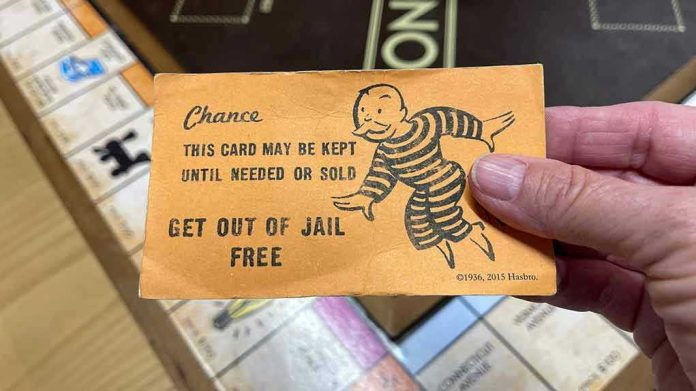
New York’s revolving-door justice system has once again put innocent lives in danger, as a repeat offender was freed without bail only to unleash a violent assault spree days later.
Story Snapshot
- A 23-year-old Bronx man, recently released without bail after a violent assault, attacked three more innocent victims in a single morning.
- Victims included a nurse, a teenage girl, and a 54-year-old woman, highlighting the vulnerability of ordinary New Yorkers under current policies.
- This case exposes the dangers of NYC bail reform laws that prioritize offenders’ rights over community safety.
- Public outcry is growing for common-sense reforms that restore accountability and put law-abiding citizens first.
Repeat Offender Unleashes Violent Spree After Release
Jeremiah White, age 23, was arrested in the Bronx after allegedly assaulting three people with a metal pipe on the morning of October 15, 2025. These attacks came just one week after he was released from custody following a prior assault on a 17-year-old girl. The victims in this shocking spree—a nurse on her way to work, a 15-year-old girl, and a 54-year-old woman—represent the everyday New Yorkers who now face rising threats as a direct result of failed bail reform policies. This sequence of violent attacks has reignited debate over the city’s decision to release repeat offenders without meaningful consequences.
Community leaders and law enforcement officials have warned for years that progressive bail reforms would jeopardize public safety. In White’s case, the justice system released him on non-monetary conditions after he allegedly punched a teenage girl at a subway station—a decision that, within days, led to further violence. The timeline is stark: White was arrested October 7 for the subway assault, released October 8, and by the morning of October 15 had allegedly brutalized three more people in rapid succession. Each victim was targeted without provocation, underscoring the randomness and danger of unchecked recidivism.
Bail Reform Policies Under Scrutiny
Bail reform in New York, implemented in 2020, was intended to reduce pretrial detention for non-violent offenders. Critics argue these changes have swung the pendulum too far, making it nearly impossible for judges to keep repeat offenders off the streets—even after they are charged with violent crimes. This policy shift has generated a wave of high-profile cases, with White’s assault spree standing out for the rapid succession of attacks after his release. The inability of judges to set bail in cases like this is a direct result of legislative mandates, leaving law enforcement and communities with their hands tied.
For families and workers in the Bronx, the real-world consequences are clear: essential workers like nurses, children, and seniors are left vulnerable while offenders cycle through the system. The targeting of a nurse, Virginia Alvarez, spotlights the impact on those serving the community. Alvarez described the suddenness and severity of her attack from her hospital bed, expressing shock that someone capable of such violence was allowed back on the streets so quickly. Many residents now worry that anyone could become the next victim under current policies.
Calls for Accountability and Policy Change
Public pressure is mounting for lawmakers and city officials to revisit bail reform, prioritizing the safety of law-abiding citizens over the rights of repeat offenders. Law enforcement unions and community advocates argue that lenient release policies are undermining years of progress in reducing crime. They point to the erosion of public trust in the justice system and the growing sense of fear among New Yorkers, particularly in high-crime neighborhoods like the Bronx. The case of Jeremiah White has become a rallying cry for those demanding that the justice system return to common sense—ensuring that those with a history of violence are kept off the streets until they can be properly tried and sentenced.
While supporters of bail reform claim that most released individuals do not reoffend, the tragic outcomes in cases like this raise serious questions about current priorities. Without reforms that balance defendants’ rights with the fundamental responsibility to protect the public, more families may find themselves grieving or living in fear. Policymakers must confront the hard truth: justice that disregards public safety is no justice at all.
Victims and Communities Bear the Burden
As the debate intensifies, it is ordinary citizens who pay the price for failed experiments in criminal justice policy. The victims of White’s spree—and countless others affected by similar incidents—are left to cope with trauma and uncertainty. Healthcare workers, already stretched thin, now face added threats on their way to serve others. Residents of the Bronx and beyond are demanding action to restore order, accountability, and true justice in their neighborhoods. Until leaders respond with reforms rooted in responsibility and respect for the rule of law, the cycle of violence fueled by reckless release policies will continue to threaten the safety and stability of American communities.
@ZohranKMamdani
Pipe-wielding NYC maniac accused of assault spree held on bail week after he was freedDoes Mamdani actually think a social worker can stop a maniac like this? He bashed a teen in the head so hard that she was bleeding profusely. Women are getting assaulted. pic.twitter.com/GFXaBYP4qp
— Katherine Manchester (@KatherineManch8) October 17, 2025
White remains in custody on three counts of assault as calls for reform grow louder. The community waits to see whether this case will finally prompt leaders to put public safety and victims first, as the Constitution and common sense demand.
Sources:
Blue city repeat offender accused of metal pipe rampage just days after release
Pipe-wielding NYC maniac accused of assault spree held on bail week after he was freed











